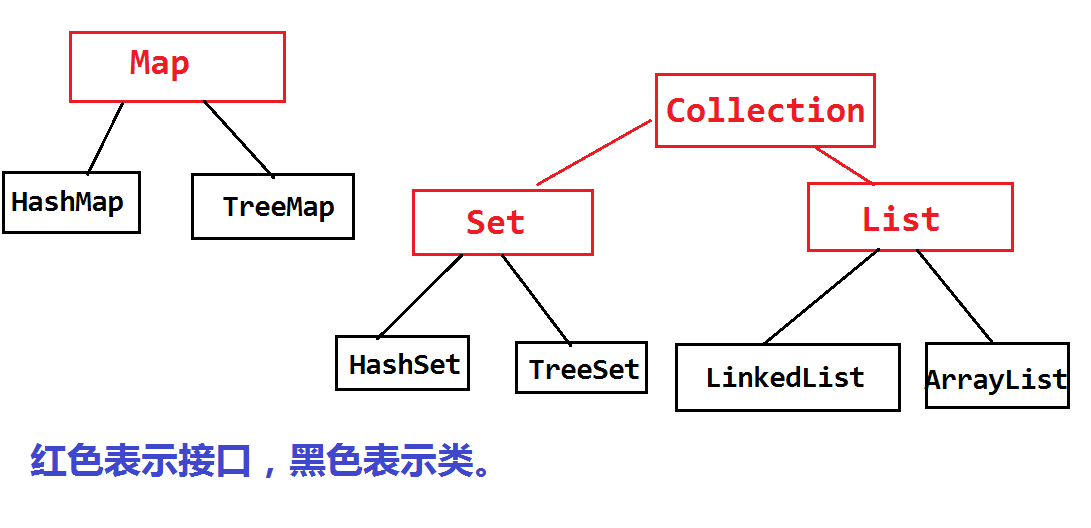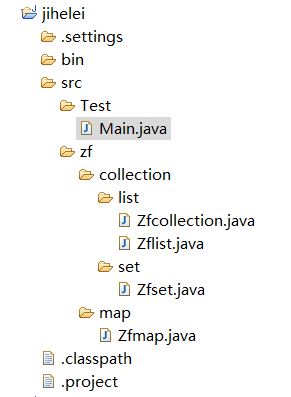java集合类总结

Collection接口通常不能直接使用,但是该接口提供了添加删除管理数据的方法,由于List接口和Set接口都实现了他的方法,因此这些方法对List和Set集合都是通用的。
方法如下:
add(Element e) 添加特定对象进集合 remove(Object o) 移除 isEmpty()-----Boolean 判断集合是否为空 iterator()------iterator 返回迭代器用来遍历集合中的对象 size()--------int 获取集合元素的个数

1 package zf.collection.list; 2 3 import java.util.ArrayList; 4 import java.util.Collection; 5 import java.util.Iterator; 6 7 import javax.jws.soap.SOAPBinding; 8 9 public class Zfcollection { 10 private Collection<Integer> co=new ArrayList<Integer> (); 11 public Collection<Integer> getCo() { 12 return co; 13 } 14 public void setCo(Collection<Integer> co) { 15 this.co = co; 16 } 17 private int temp; 18 private Iterator<Integer> it; 19 public Zfcollection() { 20 // TODO Auto-generated constructor stub 21 co.add(11); 22 co.add(12); 23 co.add(13); 24 co.add(14); 25 co.add(15); 26 } 27 public void print(){ 28 29 it=co.iterator(); 30 while(it.hasNext()){ 31 temp=it.next(); 32 System.out.print(temp+" "); 33 System.out.println(); 34 } 35 } 36 public void delete(){ 37 co.remove(11); 38 co.remove(12); 39 it=co.iterator(); 40 while(it.hasNext()){ 41 temp=it.next(); 42 System.out.print(temp+" "); 43 } 44 System.out.println(); 45 } 46 public void size(){ 47 System.out.println(co.size()); 48 co.remove(13); 49 co.remove(14); 50 co.remove(15); 51 System.out.println(co.isEmpty()); 52 } 53 }
1 package Test; 2 3 import zf.collection.list.*; 4 import zf.collection.set.*; 5 import zf.map.Zfmap; 6 7 8 public class Main { 9 public static void main(String args[]){ 10 // System.out.println("1.Collection接口的方法…………"); 11 // Zfcollection zfcollection=new Zfcollection(); 12 // zfcollection.print(); 13 // zfcollection.delete(); 14 // zfcollection.size(); 15 // System.out.println("................................................................."); 16 17 // System.out.println("2.List接口的方法…………"); 18 // Zflist zl=new Zflist(); 19 // zl.getsetprint(); 20 // System.out.println("................................................................."); 21 22 // System.out.println("3.Set接口的方法…………"); 23 // Zfset zs=new Zfset(); 24 // zs.print(); 25 // zs.printtreenewfangf(); 26 // System.out.println("................................................................."); 27 28 System.out.println("4.Map接口的方法…………"); 29 Zfmap zm=new Zfmap(); 30 31 } 32 }
List接口中元素允许重复,顺序就是对象插入的顺序,类似java数组,用户可通过使用索引来访问集合中的元素。
get(int index) set(int index,Object obj)
1 package zf.collection.list; 2 3 import java.util.ArrayList; 4 import java.util.Collection; 5 import java.util.Iterator; 6 import java.util.List; 7 8 import zf.collection.list.*; 9 10 public class Zflist { 11 private Zfcollection zc=new Zfcollection(); 12 ArrayList<Integer> list=(ArrayList<Integer>) zc.getCo(); 13 public void getsetprint(){ 14 int a=list.get(0); 15 System.out.println("在第一个节点的是:"+a); 16 list.set(4, 2345);//前提是存在这个节点。 17 // Iterator<Integer> iterator=list.iterator(); 18 for(int li:list){ 19 System.out.println(li); 20 } 21 } 22 }
Set集合中的对象不按特定方式排序,只是简单地把对象加入集合中,Set集合中不包含重复对象
Method Summary
| Modifier and Type | Method and Description |
|---|---|
boolean |
add(E e)
Adds the specified element to this set if it is not already present.
|
boolean |
addAll(Collection<? extends E> c)
Adds all of the elements in the specified collection to this set.
|
E |
ceiling(E e)
Returns the least element in this set greater than or equal to the given element, or
null if there is no such element. |
void |
clear()
Removes all of the elements from this set.
|
Object |
clone()
Returns a shallow copy of this
TreeSet instance. |
Comparator<? super E> |
comparator()
Returns the comparator used to order the elements in this set, or null if this set uses the natural ordering of its elements.
|
boolean |
contains(Object o)
Returns
true if this set contains the specified element. |
Iterator<E> |
descendingIterator()
Returns an iterator over the elements in this set in descending order.
|
NavigableSet<E> |
descendingSet()
Returns a reverse order view of the elements contained in this set.
|
E |
first()
Returns the first (lowest) element currently in this set.
|
E |
floor(E e)
Returns the greatest element in this set less than or equal to the given element, or
null if there is no such element. |
SortedSet<E> |
headSet(E toElement)
Returns a view of the portion of this set whose elements are strictly less than toElement.
|
NavigableSet<E> |
headSet(E toElement, boolean inclusive)
Returns a view of the portion of this set whose elements are less than (or equal to, if
inclusive is true) toElement. |
E |
higher(E e)
Returns the least element in this set strictly greater than the given element, or
null if there is no such element. |
boolean |
isEmpty()
Returns
true if this set contains no elements. |
Iterator<E> |
iterator()
Returns an iterator over the elements in this set in ascending order.
|
E |
last()
Returns the last (highest) element currently in this set.
|
E |
lower(E e)
Returns the greatest element in this set strictly less than the given element, or
null if there is no such element. |
E |
pollFirst()
Retrieves and removes the first (lowest) element, or returns
null if this set is empty. |
E |
pollLast()
Retrieves and removes the last (highest) element, or returns
null if this set is empty. |
boolean |
remove(Object o)
Removes the specified element from this set if it is present.
|
int |
size()
Returns the number of elements in this set (its cardinality).
|
Spliterator<E> |
spliterator()
Creates a late-binding and fail-fast
Spliterator over the elements in this set. |
NavigableSet<E> |
subSet(E fromElement, boolean fromInclusive, E toElement, boolean toInclusive)
Returns a view of the portion of this set whose elements range from
fromElement to toElement. |
SortedSet<E> |
subSet(E fromElement, E toElement)
Returns a view of the portion of this set whose elements range from fromElement, inclusive, to toElement, exclusive.
|
SortedSet<E> |
tailSet(E fromElement)
Returns a view of the portion of this set whose elements are greater than or equal to fromElement.
|
NavigableSet<E> |
tailSet(E fromElement, boolean inclusive)
Returns a view of the portion of this set whose elements are greater than (or equal to, if
inclusive is true) fromElement. |
1 package zf.collection.set; 2 3 import java.util.Collection; 4 import java.util.Comparator; 5 import java.util.HashSet; 6 import java.util.TreeSet; 7 import java.util.Iterator; 8 import java.util.Set; 9 //import java.util.Collection.*; 10 11 public class Zfset { 12 13 // Set<Integer> s=new HashSet<Integer>(); 14 TreeSet<Integer> s=new TreeSet<Integer>(); 15 Iterator<Integer> it; 16 int temp; 17 18 public Zfset() { 19 // TODO Auto-generated constructor stub 20 s.add(11); 21 s.add(12); 22 s.add(13); 23 s.add(14); 24 s.add(15); 25 s.add(16); 26 s.add(17); 27 s.add(18); 28 s.add(19); 29 s.add(20); 30 s.add(11); 31 s.add(12); 32 } 33 34 public void print(){ 35 it=s.iterator(); 36 while(it.hasNext()){ 37 temp=it.next(); 38 System.out.print(temp+" "); 39 System.out.println(); 40 } 41 } 42 43 public void printtreenewfangf(){ 44 /** 45 * 以下方法是TresSet类新增的方法。 46 * 只有Tree类可以调用新方法,其父类不可。 47 * */ 48 int begin=s.first(); 49 int terminal=s.last(); 50 Comparator cp=s.comparator(); 51 Set<Integer> headset=s.subSet(12, 17);//规则是:[),headSet subSet tailSet 52 53 System.out.println(begin+" "+terminal+" "); 54 // for(int a:s){ 55 // System.out.println(a); 56 // } 57 System.out.println("headset:"); 58 for(int a:headset){ 59 System.out.println(a); 60 } 61 //System.out.println(cp.toString()); 62 } 63 }
Map
提供key到value的映射,Map不能包含相同的key,每个key只能映射一个value。key决定了存储对象在映射中的存储位置,但不是由key对象本身决定的,通过散列技术进行处理。
Method Summary
| Modifier and Type | Method and Description |
|---|---|
void |
clear()
Removes all of the mappings from this map (optional operation).
|
default V |
compute(K key, BiFunction<? super K,? super V,? extends V> remappingFunction)
Attempts to compute a mapping for the specified key and its current mapped value (or
null if there is no current mapping). |
default V |
computeIfAbsent(K key, Function<? super K,? extends V> mappingFunction)
If the specified key is not already associated with a value (or is mapped to
null), attempts to compute its value using the given mapping function and enters it into this map unless null. |
default V |
computeIfPresent(K key, BiFunction<? super K,? super V,? extends V> remappingFunction)
If the value for the specified key is present and non-null, attempts to compute a new mapping given the key and its current mapped value.
|
boolean |
containsKey(Object key)
Returns true if this map contains a mapping for the specified key.
|
boolean |
containsValue(Object value)
Returns true if this map maps one or more keys to the specified value.
|
Set<Map.Entry<K,V>> |
entrySet()
Returns a
Set view of the mappings contained in this map. |
boolean |
equals(Object o)
Compares the specified object with this map for equality.
|
default void |
forEach(BiConsumer<? super K,? super V> action)
Performs the given action for each entry in this map until all entries have been processed or the action throws an exception.
|
V |
get(Object key)
Returns the value to which the specified key is mapped, or
null if this map contains no mapping for the key. |
default V |
getOrDefault(Object key, V defaultValue)
Returns the value to which the specified key is mapped, or
defaultValue if this map contains no mapping for the key. |
int |
hashCode()
Returns the hash code value for this map.
|
boolean |
isEmpty()
Returns true if this map contains no key-value mappings.
|
Set<K> |
keySet()
Returns a
Set view of the keys contained in this map. |
default V |
merge(K key, V value, BiFunction<? super V,? super V,? extends V> remappingFunction)
If the specified key is not already associated with a value or is associated with null, associates it with the given non-null value.
|
V |
put(K key, V value)
Associates the specified value with the specified key in this map (optional operation).
|
void |
putAll(Map<? extends K,? extends V> m)
Copies all of the mappings from the specified map to this map (optional operation).
|
default V |
putIfAbsent(K key, V value)
If the specified key is not already associated with a value (or is mapped to
null) associates it with the given value and returns null, else returns the current value. |
V |
remove(Object key)
Removes the mapping for a key from this map if it is present (optional operation).
|
default boolean |
remove(Object key, Object value)
Removes the entry for the specified key only if it is currently mapped to the specified value.
|
default V |
replace(K key, V value)
Replaces the entry for the specified key only if it is currently mapped to some value.
|
default boolean |
replace(K key, V oldValue, V newValue)
Replaces the entry for the specified key only if currently mapped to the specified value.
|
default void |
replaceAll(BiFunction<? super K,? super V,? extends V> function)
Replaces each entry's value with the result of invoking the given function on that entry until all entries have been processed or the function throws an exception.
|
int |
size()
Returns the number of key-value mappings in this map.
|
Collection<V> |
values()
Returns a
Collection view of the values contained in this map. |
1 package zf.map; 2 3 import java.util.Collection; 4 import java.util.HashMap; 5 import java.util.Iterator; 6 import java.util.Map; 7 import java.util.Set; 8 9 public class Zfmap { 10 Map<Integer, Integer> zm=new HashMap<Integer, Integer>(); 11 public Zfmap() { 12 // TODO Auto-generated constructor stub 13 zm.put(1, 101); 14 zm.put(2, 102); 15 zm.put(3, 103); 16 zm.put(4, 104); 17 zm.put(5, 105); 18 Set<Integer> set=zm.keySet(); 19 for(int a:set){ 20 System.out.println(a); 21 } 22 Collection<Integer> collection=zm.values(); 23 for(int b:collection){ 24 System.out.println(b); 25 } 26 zm.remove(5); 27 Iterator<Integer> iterable=zm.keySet().iterator(); 28 while(iterable.hasNext()){ 29 int a=iterable.next(); 30 int b=zm.get(a); 31 System.out.println("key:"+a+" "+"value:"+b); 32 } 33 System.out.println(zm.containsKey(2)+" "+zm.containsValue(103)+" "+zm.get(4)); 34 35 } 36 }
贵有恒何必三更眠五更起,最无益只怕一日曝十日寒。




